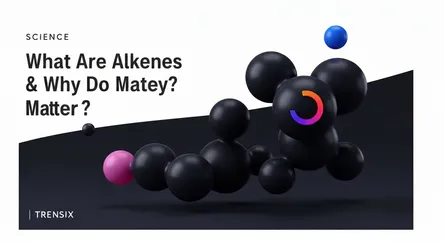Science
What Are Alkenes & Why Do They Matter?

An introduction to alkenes, the unsaturated hydrocarbons that are essential building blocks for plastics, detergents, and many other everyday materials.
What is it?
Alkenes are a class of unsaturated hydrocarbons in organic chemistry, meaning they contain at least one carbon-carbon double bond (C=C). Their general formula is CnH2n. This double bond is their functional group and makes them significantly more reactive than alkanes, which only have single bonds. The simplest and most industrially important alkene is ethylene (ethene), C2H4. Depending on the number of carbon atoms, alkenes can exist as gases, liquids, or waxy solids at room temperature. They are generally colorless, non-polar compounds that are combustible.
Why is it trending?
The importance of alkenes stems from their reactivity, which makes them invaluable as starting materials (feedstocks) in the chemical industry. Their carbon-carbon double bond can be readily broken to add other atoms, a process central to creating a vast range of other substances. They are prominently used in polymerization reactions, where small alkene molecules (monomers) are linked together to form long chains (polymers). While not abundant in crude oil, they are efficiently produced by a process called cracking, ensuring a steady supply for industrial manufacturing.
How does it affect people?
Alkenes are fundamental to the production of countless products that impact daily life. Their most significant use is in making plastics; polyethylene (from ethene) is used for plastic bags and bottles, and polypropylene (from propene) is used for containers, ropes, and car parts. They are also used to synthesize alcohols, such as ethanol. Other common products derived from alkenes include antifreeze (ethylene glycol), detergents, synthetic fibers, and lacquers. Additionally, ethene gas is used commercially as a plant hormone to artificially ripen fruits like bananas and tomatoes.